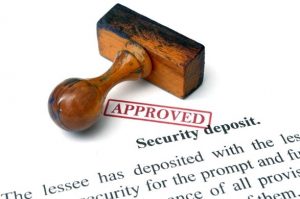 No, residential landlords are not allowed to use any portion of a tenant’s security deposit during the term of the tenancy. After the tenancy has ended, the landlord can only apply the security deposit to damages to the apartment caused by the tenant (more than wear and tear) and unpaid rent.
No, residential landlords are not allowed to use any portion of a tenant’s security deposit during the term of the tenancy. After the tenancy has ended, the landlord can only apply the security deposit to damages to the apartment caused by the tenant (more than wear and tear) and unpaid rent.
In Massachusetts, residential landlord’s duties and responsibilities for holding/applying security deposits are governed by M.G.L. c. 186 §15B. Upon inception of a tenancy, landlords are only allowed to accept the following from a tenant:
1. First month’s rent;
2. Last month’s rent;
3. Security deposit; and,
4. Cost of purchase and installation of key and lock.
If a landlord collects security deposit from a tenant then a legally sufficient Apartment Condition Statement which conforms with the strict language of the statute must be completed and signed by the landlord and tenant at the time of move in. Moreover, landlords must keep and hold the security deposit in a separate, interest-bearing account at a bank located within the Commonwealth of Massachusetts. The prevailing interest rate of the bank holding the security deposit is deemed the property of the tenant and should be left in the account until the appropriate time. The landlord is responsible for providing certain documentation evidencing this to the tenant within 30 days after commencement of the tenancy.
During the time the tenant has possession of the apartment, a landlord cannot access these funds as they are treated as the tenant’s property. After the tenant has vacated and the landlord has inspected the apartment for damage by comparing the aforementioned Apartment Condition Statement then the landlord may retain only the portion of the security deposit that is used to: (1) repair damage caused by the tenant to the apartment, the damage must be more than normal wear and tear, and (2) recoup any unpaid rent. If the landlord is retaining the security deposit to repair damage caused by the tenant then landlord must provide specific documents to the former tenant itemizing such repairs. These documents and the remaining security deposit plus interest must be provided to the former tenant within 30 days after the tenant has moved out.
The security deposit statute is very specific and a cause for headaches among landlords. The penalties for violation can result in substantial monetary damages to the landlord. If you have any questions regarding your obligations as a landlord or if you want to ensure you have the tools you need to insulate yourself from the pitfalls of holding a security deposit, please contact our office to speak with an attorney.

